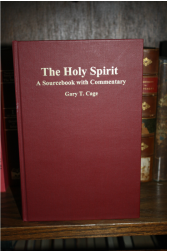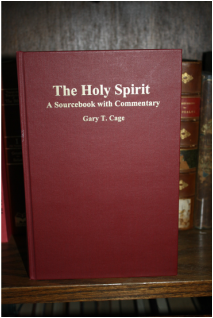The Holy Spirit: A Sourcebook With Commentary by Gary Cage
Reviewed by Nathan Battey

Gary Cage is a member of the cups and class Church of Christ in Reno, Nevada. He was asked to do a weekly study on the Holy Spirit and after delivering nearly two years worth of studies on the subject he put all his material together in book format. His work formed a rather large volume, totaling 630 pages, and was published for the first time in 1995.
Nature of the Work:
The book is just what it’s title claims to be: It is a sourcebook and commentary on the subject of the Holy Spirit. There are three words in the Bible that are translated as Spirit: ruach (Hebrew), neshamah (Hebrew), and pneuma (Greek). Mr. Cage traces these three words throughout the Old and New Testaments and gives commentary on every verse containing them. The layout of his book reminds me of how the Temperance Bible Commentary approaches a discussion of the word “wine” in the Bible. He begins in the Old Testament and address each verse in chronological order. He then traces each word through Zoroastrian literate, the Dead Sea Scrolls, the Septuagint, the Pseudepigrapha, the Talmud, the Targums, Philo and Josephus, and Graeco-Roman literature in order to show how Jews viewed the Holy Spirit and how the their neighboring influences viewed the subject and influenced their thinking.
Having established a Jewish background and understanding of the subject, Mr. Cage proceeds to delve into the New Testament and look at all the verses containing the term pneuma. He begins with the Synoptic Gospels and Acts, then deals with the writings of John, and concludes with Paul’s teachings. He views (as do I) Paul’s writings as being the more difficult on the subject and utilizes the hermeneutic principle of allowing the clear to interpret the difficult. I believe this approach helps this work to succeed where others fail.
Pros to This Book:
1- Mr. Cage reveals his view of the Holy Spirit in the introduction and challenges his reader to make test his honesty and understanding in light of the Scriptures. I personally found this helpful and believe it would be helpful whether the reader agrees with his conclusions or not. His basic premise is that when the Holy Spirit personally indwelt a person, in either the Old or the New Testament, it was connected with miraculous abilities and did not indicate the person was saved. His conclusion is that the Spirit indwells Christians today through the word, miracles have ceased, and salvation does not come through a direct operation of the Spirit.
2- He does an excellent job of showing which verses apply to the Holy Spirit and which ones are speaking of the wind etc., man’s spirit, and God’s spirit. When he comes to difficult passages, he lays multiple options before the reader and explains why he has chosen his interpretation. In doing so, he also documents the other positions and provides an extensive bibliography of references so the reader can cross check his work and dig deeper if they so choose.
3- After considering a section or writing, Mr. Cage provides detailed charts to assist the reader with sorting through and analyzing the data. I found this most helpful.
4- This work provides excellent commentary in general. Few writers deal with the subject of the Holy Spirit in the Old Testament, yet Mr. Cage deals with it extensively. His commentary on New Testament passages offers helpful material in areas besides just the Holy Spirit. I will be sure to reference this work in the future as a general commentary as well as a sourcebook on this particular subject.
5- Each chapter has excellent introductions and summaries. Even if you choose to not consider every text as he does, I believe you will find the introductions and summaries enlightening.
My General Opinion: (5/5*****)
All in all I found this to be a very scholarly work, though there are a few typos here and there. I highly recommend it for teachers, preachers, and serious Bible students interested in a thorough investigation of the subject or looking for a good commentary on difficult passages of Scripture.


 RSS Feed
RSS Feed
